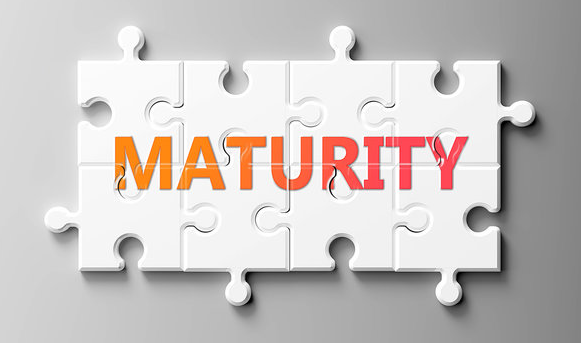What constitutes maturity?
To unveil the truth about maturity, one must transcend from the aisle of deep self-absorption and impulsivity within
Post by RK News on Saturday, June 24, 2023

FIRDOUS AHMAD MALA & HAMNAH BINTI IDRIS
In a general sense, maturity can be understood as complete growth or development. Therefore, evaluating someone's maturity would involve assessing whether they have reached a fully developed or final state. Maturity, as a characteristic of a person's personality, is highly desired and held in high regard. It is openly displayed and sometimes even boasted about. Its significance is widely acknowledged by oneself and appreciated by others. An exquisite tapestry woven with the filaments of introspection, enlightenment, wisdom, brooding, acceptance, and acknowledgment of dynamic behavioral patterns is an essential part that comprises maturity.
Singling out the mature from the immature would call for the identification of the salient characteristics of maturity. This is easier said than done. However, if they are identified, these characteristics, usually exhibited through a person’s actions, can help one identify or single out mature individuals. Among others, these characteristics include a willingness to act in ways that benefit not just acquaintances but also common folks. In other words, being gregarious and philanthropic is a salient characteristic of maturity. Similarly, being unpretentious, altruistic, and, engaging in rational endeavors, an exhibition of reasoning, and control over emotions have been identified as the traits of maturity.
An understanding of maturity as a personality trait stands thoroughly discussed. Among those who have deliberated upon it are Aristotle and Immanuel Kant. Kant in “An Essay to the Question: What is Enlightenment” presents an in-depth and conceptually ingrained understanding of what constitutes immaturity. Kant says, “Immaturity is the inability to make use of one’s own understanding without the guidance of another.” To him, immaturity is not the inability that sprouts out of the lack of understanding; rather, it is the inability or the lack of resolution and courage to use it without some external aid. As a matter of fact, he held that maturity is a natural state of humanity and the only qualification required for its achievement is ‘freedom’, freedom to make common or public use of one’s reason in all matters. Kant elucidates three qualifications must for maturity- public use of one’s reason, getting better of one’s cowardice and laziness and developing one’s freedom of thought. Kant’s description of the qualifications has, however, been discounted for he does not take into account, in desired degrees, the role of emotions within a mature individual. His mature person is bland.
To understand how Aristotle viewed maturity, it is useful to understand what constitutes virtue ethics. It is a field of ethical thought that promotes that an individual’s life goal must be striving for the greatest possible good. No conscious or deliberate attempts will be made here to single out what constitutes a virtue. Let the readers understand that virtues are activities or endeavors that are either concerned with a person’s intellect or character. Thus we have intellectual virtues and moral virtues. Acquisition of both these types calls for practice. But, as Aristotle understood it, the former is an outcome of learning; the latter of habituation. In his words, “Virtue of thought arises and grows mostly from teaching; that is why it needs experience and time. The virtue of character results from habit.” Maturity is one such virtue. Samuel Ullman, an American poet, humanitarian and religious leader quotes, “Maturity is the ability to think, speak and act your feelings within the bounds of dignity. The measure of your maturity is how spiritual you become during the midst of your frustrations.” He did not cage his stance on maturity by circumscribing a certain way that ought to be followed. Yet, he instilled his insight into maturity in a way that may involve each aspect of life be it our thoughts, speech, or deeds where the execution must be done in a manner that is amicable and courteous enough. He gave it a beautiful essence by striking a balance between one’s relationship with divinity and the inner self. He coherently mentioned that the magnitude of maturity in a being can be ascertained by the spirituality/sanity that is exhibited during a situation that is quite despicable to handle.
To unveil the truth about maturity, one must transcend from the aisle of deep self-absorption and impulsivity within. The mere thought of embarking on the journey to attain maturity is a portent of maturity. Humankind was created in a way that it is very often and inevitably subjected to certain circumstances which require enormous and erratic changes. These changes may prove to be quite exasperating and infuriating for many, and this is where a greater portion of maturity is buried and thus requires exhumation. As John Huston Finley, the former Commissioner of Education of the State of New York and a former Professor at Princeton University said, “Maturity is the capacity to endure uncertainty.” Conceding to his thought, endurance plays a pivotal role in expanding the environment of maturity through mutual respect, profound empathy, and compassion towards others when it is the least expected.
Maturity is erroneously associated with a multitude of incidents and circumstances with the mere ascend of chronological age. Though times bear the best evidence of the fact that it is not associated with confinement to greater numbers of age alone. Rather it is an amalgamation of various aspects of life passing from generation to generation. Sometimes it may be depicted in the silence to a foolish argument, and many times in willingness to consider and capacitate a wise word.
(Firdous Ahmad Mala is Assistant professor, Government Degree College Sopore and Hamnah Binti Idris is associated with Jahurul Islam Medical College, Bangladesh)